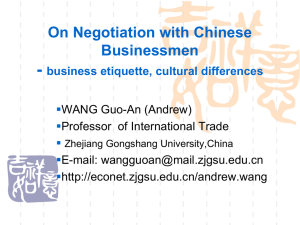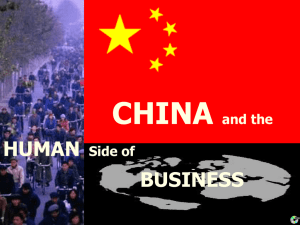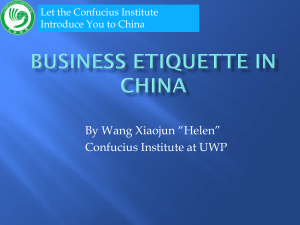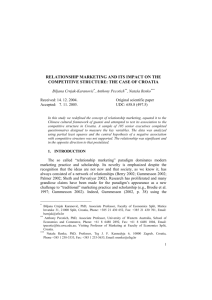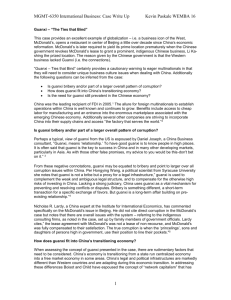Rencheng
advertisement
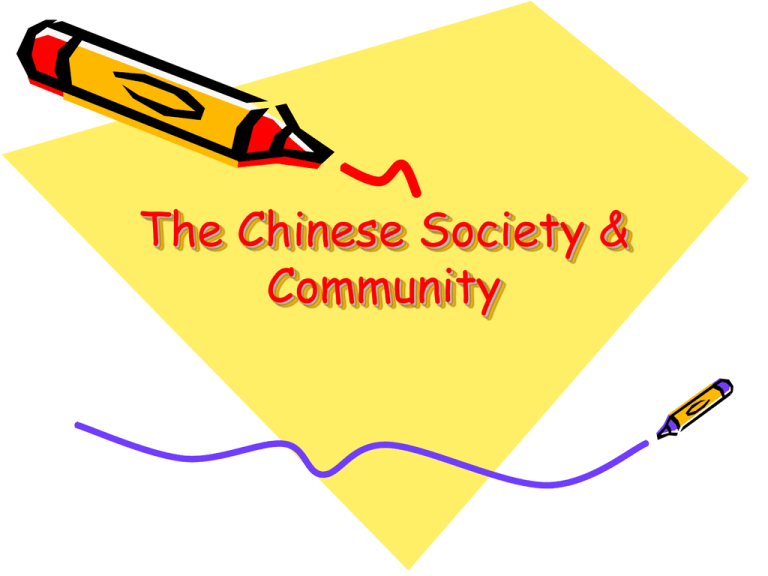
The Chinese Society & Community Outline • 1. The individual and the Community • 2. Rencheng人情/ “feelings” & Guanxi 關係 /“interpersonal-relationship-web” in Human Relationships • 3. “Face”面子 1. The Individual & the Community • Confucianism: a social order in this world.世俗和諧秩序 • An individual and the community are closely related. 1. The Individual & the Community • An individual is not an isolated self • ren, 仁 = 二人 (two persons) • ren can only be found in human relation, within a community. 1.1 (Focused) Family • Family:a communal system. • T. Parson (sociologist), “China is a familistic community.” 以家庭為本位 • traditional Chinese: • – Identity: not individualistic, but refer to relationships of the 5 relationships 1.1 (Focused) Family • The Analects (12.11): human-relationships – father/son父子 (the most important/ foundamental ) – the superior/ inferior君臣 • Chinese: 5 important human-relationships五倫 – 3 family relationships; 2 further extensions • father/son父子 (loving & caring 愛vs. filial孝) • the superior/ inferior君臣 (according to li禮vs. doing his utmost忠) (A 3.19) • husband/wife夫妻 (respect敬vs. obedience從) • elderly/young長幼 (according to hierarchy有序) • friends朋友 (trustworthiness信) 1.1 (Focused) Family: On Filial • • Direct questions on filial in The Analects “Give your father and mother no cause for anxiety other than illness 父母唯其疾之憂” (A 2.6) • “Nowadays for a man to be filial means no more than that he is able to provide his parents with food. Even hounds and horses are, in some way, provided with food. If a man shows no reverence, where is the difference? 今之孝者,是謂能養.至於犬馬,皆能有養;不敬, 何以別乎?” (A 2.7) • “What is difficult to manage is the expression on one’s face. As for the young taking on the burden when there is work to be done or letting the old enjoy the wine and the food when these are available, that hardly deserves to be called filial 色難.有事,弟子服其 勞;有酒食,先生饌,曾是以為孝乎?” (A 2.8) 1.1 Confucius’ Idea of Xiao : Are you a good/moral person? = Do you treat your parents well? • Classic of Filial Piety孝經 • A text of conversations between Confucius & Zengzi, the disciple famous for his filial piety – “Of all the hundred excellent behavior, xiao is the first.” • Xiao: – – – – “support/ respect/ obey/ honor your parents” “mourning for their death for 3 years” “bring honor/never disgrace to one’s ancestors & family” “having a son” 1.1 Xiao : Are you a good/moral person? = Do you treat your parents well? • Guojujing, The Twenty-four Filial Exemplars 廿四孝 – 24 stories of filial children with filial piety – A popular book for children • Before the open exam in Tong Dynasty, official appointment is by referral – Check with the head/ elderly of your village: • Are you a good/moral person? = Are you a filial son? 1.1 (Focused) Family: On Filial (xiao) • Xiao: – The Analects & The Mencius: • Do not blindly obey your parents • One should improve the morality/ wrong action of one’s parents • E.g. a father who steals a sheep (Analects) • E.g.King Shun vs. his father (the blind man) (Mencius) – After Sung-ming Neo-Confucians: • You have to obey everything said by your parents 1.2. The Self of a Chinese • Individualism: strongly suppressed by one’s family 個體的獨 立存在得不到承認 • Chinese: seldom consider themselves as individuals – but e.g., the father of his son, the son of his father, the brother of his siblings, the husband of his wife… • the head in the family – usually the most senior/eldest male: grandfather/ father – All respect & listen to his words. – but internal family issues: the most senior female • hierarchy is clear 1.2. The Self of a Chinese • obligation & duty (for every member) : – Loyal/ sacrifice for the family 个人義務,責任: 捍衛家庭,為 家人作犧牲 • privilege: – within the family structure, can always rely on & support by one’s family 个人權利: 受家庭保護, 被家人支持 • BUT males only (carry on family name) vs. female (will be under another family name, never a full member of her parents’ family) 1.3 Extended family • the concept of family: unclear/flexible/vague • Extended family: – the whole village of same family-name are all relatives – Same ancestor ages ago = an extended family • Boss in a company: father of the employees • King: father of the whole country • Chinese: distinguish/specific titles for various (distant) relatives – e.g.姨媽姑姐叔伯舅父堂表兄弟姊妹 vs. Western uncle/aunt 1.4 Guanxi/ Relationship Network个人關係網 • an individual & the others: mutually-dependent 互相依賴. • Chinese love to build up relationships with other people • E.g. building close connection by marriage. ie. “We are, then, family members & should take care/favor each other ” – 1. the self is related to his “family” – 2. one as the center to build up his other relations. – only after Person A has a relationship with Person B, then A knows how to deal with B. (e.g. B is the A’s classmate’s friend.) – Nancy Riley, “While family is not the only source of guanxi… There ties are often the easiest to access, interpret, and deal with. .. Government restrictions on mobility in China may have strengthen guanxi network based on kin…” 1.4 People with Guanxi/ Us • Why prefer the one with guanxi? – Security/ trustworthiness/ reliable • someone you “know” =us = we = in-groupmembers • Chinese: – privilege/care a lot more for “us” than Westerners 1.5 Strangers/ “outsiders”/ “them” 陌生人/他們 • Strangers: – – – – – Outsiders unrelated people = nobody, can be ignored No need to think of them 人不為己,天誅地滅 Unreliable, even want to cheat you at least, prepared that they are going to cheat you • Chinese vs. Westerners: – Much more egocentric/selfish towards the unrelated/strangers 2. The Importance of Feelings (renching 人情) in Human Relationships • The very first usage of the term, renching人情: • The Book of Rituals/ The Book of Li, – “What is rencheng? Happiness, anger, sadness, love, hatred, desire. These seven are not learned but possessed (禮記: “何謂人情?喜,怒,哀,樂,愛,惡,欲) – i.e. = natural feelings towards “things/man” in the world 2. The Importance of Feelings in Human Relationships • Idea of renching : vague & complex – 1. rencheng as something all human beings should have – 2. equal importance: • law, the propensity of tian & rencheng (“世上三不過意,王法 天理人情,這箇全然不顧,此身到處難容”) – 3. to have a harmonious relationship with others in “your” community (懂人情世故) – 4. rencheng =the same status as reason理 • e.g. one should act “according to both rencheng & reason/ rationality/fairness” – 5. for some: even place rencheng far above reason 2. Renching & Confucianism • Confucian morality: a harmonious community. • 1. Basic backbone: – relationship among “ (focused & extended) family members” • i.e. the ‘family relationship web’ • 2. Extension: – People your know/with guanxi • network of the web (1+2): harmonious social structure • Chinese social structure: not from individual/ personal, but relationship between people/ exchange among people 2. The Importance of Feelings in Human Relationships • rencheng/ social relationship: – exchange between 2 persons – explains how the society is possible. • The Book of Li/Rituals, “Received but not returned is not according to rituals/li.” (礼記: “來而不往非礼也’ • Rituals (li) : an ancient model of how to behave in the community – Confucius on rituals: – e.g. “Stand on rituals.立于礼” “Those do not learn li cannot find their stand.不學礼,無以立” 2. The Importance of Feelings in Human Relationships • “The way of the Master (Confucius) consists in doing one’s best (zhong) and in using oneself as a measure to gauge the likes and dislikes of others (shu)” 曾子曰: “夫子之道,忠恕而已 矣.” (Analacts 4.15) • 1. zhong忠 =“Impose on others what you desire.” • 2.Shu 恕= “Do not impose on others what you do not desire.” • (“己之所欲, 亦施於人,是忠. 己所不欲,勿施於人,是恕.”) • zhong & shu = Confucian virtues (德de). 2. The Importance of Feelings in Human Relationships • Confucians’zhong & shu : – assumes human desires are similar “性相近” (A 17.2) – Knows others’ feeling by referring from one’s own 推已及人 (A 6.30) • interpersonal relationship in a community (renching) 處世接物之道 : – bases on commonsense/social knowledge/ everyday experience 2. The Importance of Rencheng in Human Relationships • Confucian social theory: exchange behavior • Confucian idea: ren = between at least 2 persons • Reciprocity報 : universal – i.e.the duty of repaying the goodness of another 有來有往,親眷不冷場; 圓團來,塌餅去,人 在人情在 • 1. to give施 or to receive受 • 2. to repay報. 2.1 Two Kinds of Guanxi/Renching Debt • 1. with special status – e.g. a father should be loving, a son should be filial孝 – these persons have role requirement/ duties to be fulfilled – 史搢臣: “願體集”-“父慈,子孝,兄友,弟恭,縱到極盡處,只是合 當如此,着不得一毫感激居功念頭.” • 2. without special status – emphasis the repay / particular guanxi or rencheng 2.1 Renching Debt among those Without Special Status • guanzi = vague, unclear • rencheng debt: – among those without special stats/ related by certain guanxi 有 些交情/關係: cannot be easily calcualted/ repaid – E.g. attending a funeral/ wedding • Traditional expectation: – rencheng payer: morality of the sage聖人道德 • not expecting repayment – rencheng receiver: morality of a junzi君子道德 • should repay the favor 2.1 Guanxi/Renching Debt • Exchange: economical or social • Medium of exchange – economic exchange: money, can be more easily calculated • If impersonal/ affective-neutrality – no rencheng involved – simple – Social exchange: “renching balance sheet” • renching debt: often cannot repaid in full/calculated • “Do not have rencheng debt”; “rencheng debt is even worst than financial debt” “人情緊過債”, “賴人情不如賴債,賴了人 情難做人” 2.2 Chinese “rencheng” vs. Western “gratitude” • Chinese “rencheng” – E.g. to repay your rencheng debt, yet should repay by even more rencheng in the future • For a Chinese: – even after he repays the favor – always remembers the event & favor – Even, treats the giver well till death. • Western “gratitude” – once he repays the favor, he does not owe the giver anything. 2.2 Rencheng Debt人情債 • Chinese rencheng : – not to be repaid in the short-run – but to keep a long-term relationship/ “investment” • Two known parties (with no special status): – usually socially related by rencheng/guanxi 2.3 Summary: Rencheng & Guanxi • Universal: “duty” & “obligation” between relatives and friends • • With guanxi/rencheng = the in-group/us/we自家人 Confucius harmony/morality: extending out from the self to • Social exchange: far more important than economic exchange. • Pure economic exchange: rare – – – – Family community State humanity – always involves rencheng, from business partnership to shopping in the market. 2.3 Rencheng Web • Social relationship: • 1. primary group初級團體 (much more important) – people with special relationship • 2. secondary group次級團體 (less important) – law & order • Social opinion: based on rencheng – i.e. you have to help your “group members” • Chinese society: many people ignore fairness公平 & favor those with rencheng. 2.3 Rencheng Web • For example, as an official: – one has to “help” one’s relatives, rather than strictly following law and order. – One tend to fulfill request of the primary group, then the secondary group • Traditional Chinese: conflict between primary/secondary: prefer the former. 2.4 Rencheng & Economic Exchange • HOWEVER: • Economic exchange經濟性交換 is essential: – conflict between rencheng & rationality理性 • Ways of avoiding rencheng: – e.g. local people cannot become government official in their home town - e.g.merchants tend to do business in other areas 2.4 Rencheng & Economic Exchange - E.g. traditional village holds a market on a regular basis. Villagers (who know each other well) do small business in the market place, where highlighting the theme of “doing business, no rencheng” - “好兄弟,勤算賬” ; 史搢臣: “願體集”: “‘交財一事最 難,雖至親好友,亦須明白,寧可後來相讓,不可起初含糊. 俗語云: ‘先明後不爭,’至言也.” “To discuss business issues from the very beginning.” 2.5 Advice for Managing Rencheng Debt • 1. Refuse to accept the gift/favor, so as to avoid rencheng debt or to refuse to build up social relationship with the “giver.” • 2. To repay an “equal value” at once. This strategy tends to be more popular in more developed societies. But traditionally, this arrangement can be taken as not willing to build up an interpersonal relationship with the giver. 2.5 Advice for Managing Rencheng Debt • 3. Best Method: Remember the rencheng debt人 情債. Wait for an appropriate opportunity to repay. To maintain a long-term relationship. • 4. Receive the gift but not return, perhaps because the receiver does not have the ability to repay. Then the receiver becomes a renchengdebtor. ** This is a subtle way to show that you do not want to have any relationship with the rencheng payer. 3. Summary of Guanxi & Renching • Guanxi : essential in Chinese community – far more important than Western friendship友 情. • People are connected by with renching/ byguanxi • Distinguish people into 2 types: – with guanxi (we, us) – without guanxi (they, them). 3. Guanxi / Relationship Web • Guanxi, closely related to rencheng, is flexible and vague. • Guanxi, e.g, I’m your teacher’s friend’s son. That is, your teacher is my “uncle.” We are already of guanxi. 3.1 Guanxi in a Confucian Society • Ren 仁: involves 2 person, emphasizes social relations • Chinese community: Nonindividualistic, non-community-based, but guanxi-based. 4. “Face”面子: A social Entity • Lin Yutang林語堂(1935), – “Face cannot be translated or defined” – complexity/embedment in Chinese • Goffman, Erving (1955), – “Face may be defined as the positive social value a person effectively claims for himself by the line others assume he has taken during a particular contact.” – an image of self in terms of approved social attributes” • Carr, Michael (1993), – meaning “prestige; dignity; honor; respect; status” 4. “Face”面子 • “saving face”有面子: – individual dignity: through appropriate behavior & appreciation from the community/group. • “losing face”沒面子: – cannot act according to the expected behavior & others look down on you. – when one is embarrassed or humiliated in the eyes of others • Face: linked honor and humiliation 4. “Face” = universal • Face: • 1. individualistic (concerning of your own self) – Everyone cares • 2. collective (impact on the “group” you belonged) – Less important in some cultures – white-lies vs. always praise, no negative comments after speech • Agassi, Joseph & I.C.Jarvie (1969), – universal, fundamental in human culture • Ho, David Yaufai (1976), – “What constitutes face and the rules government face behavior vary across culture, its concern is invariant. Face is universal. 4. “Face” = universal - more important in some cultures • Chinese old sayings: – “Face is always given/judged by others, losing fact is due to your acts” “面是人家給, 醜是自己 取” – “A person needs face as a tree needs bark” “人要面樹要皮” – “Give me some face…” “看在我的面上/ 給我一 些面子…” 4. “Face” • Traditional Chinese: – in birthday party/wedding/funeral: • Wealthy: elaborative to show-off • Poor: not to be looked down on (borrowing money for the “show”) – Protect integrity of the group/ oneself • “never disclose weakness/negative issues of the family” (“家醜不出 外傳”) • “only express success/good news but not unhappiness/ failure” – Avoid Conflict; Group Harmony (li/harmony in Confucianism) • say “no” in a subtle way 4.1 “Face • • I. Historical reasons 1. --Chinese: very restricted in geographical mobility. E.g. till late 1900, a tradition to live in the same village for generations --US: people have been mobile virtually from earliest days of European colonization II. Cultural reasons – Low-context culture vs. High-context culture 4.1.1 Low-context culture (US and Western) Verbal communication direct Low-context culture Mutual understanding Freedom of the individual 4.1.2 High-context culture (Asia, Middle East, Latin America) Collectivistic Hierarchical and traditional High-context culture Dislike direct confrontation Group harmony important 4.2 Low-context Culture in China • Confucian culture: – one’s identity: not an individual, but upon your family name/ parents/ school/ home-village/ county… e.g. one succeeds in the open exam, glory for all the above • Emphasize filial piety: e.g. lose face = disgrace for your parents, they would be taken as bad parents 4.2 Protecting “Face” among Chinese • Be deferential to those above you by virtue of age or position. • Be considerate of those below you by virtue of age or position. • Do not expect that a Chinese will act contrary to group norms. • Do not insist that your host respect your rights or opinions. • Do not in any way defy your hosts’ accepted moral standards. • Do not show anger and avoid confrontations, especially openly, i.e. in front of a group. 4.2 Protecting “Face” among Chinese • If you must say no, try to do so as tactfully as possible. • If you must criticize, do so in private or, when in public, in the context of upgrading an entire working group’s performance 4.3 Dealing with “Lose Face” Situation • Deal with it seriously • Settle the situation in complete privacy • Be extremely respectful and considerate in the future 4.4 Doing Business with Traditional Chinese • Chinese: renching & guanxi – – Offend an important person in a Chinese business = offending the entire company= no business (could be for a long period) Long-term partnership vs. one-time/ short-term business • Chinese employee: • Give Chinese “face” : – – – – – – – never openly object his employer Retain face for both Respect/follow hierarchy/ obligation titles recognition/praise in private & public make them feel & look good Criticize indirectly & in private (starting with praise is a good tactic) Face: Summary • Chinese & Western personality structure differs • All parties should pay respect & accommodate to differences in culture and society

